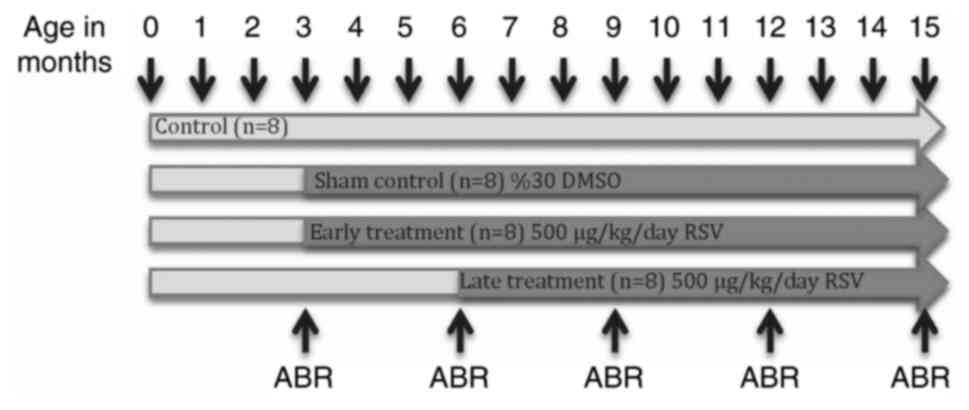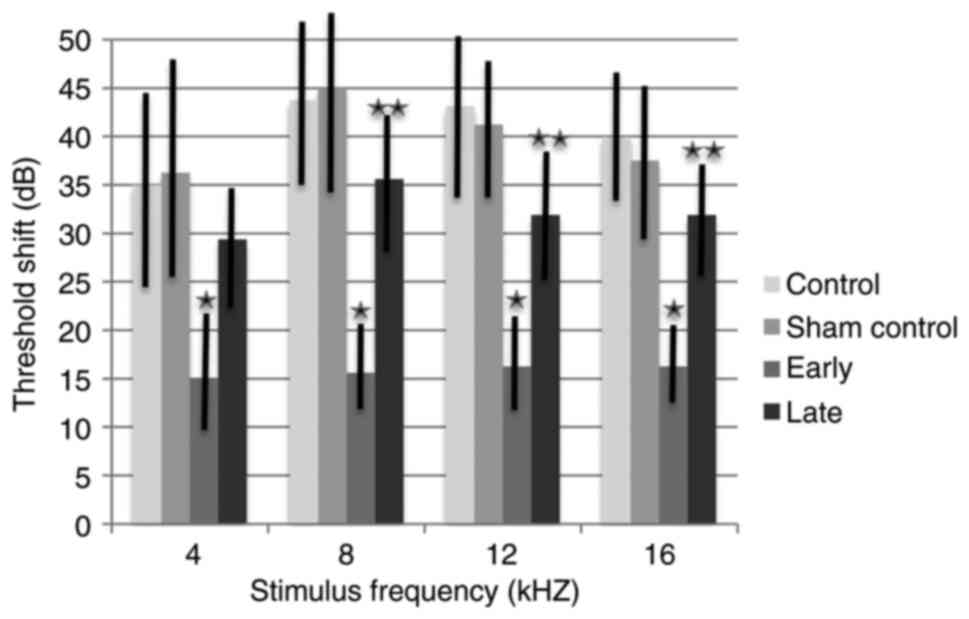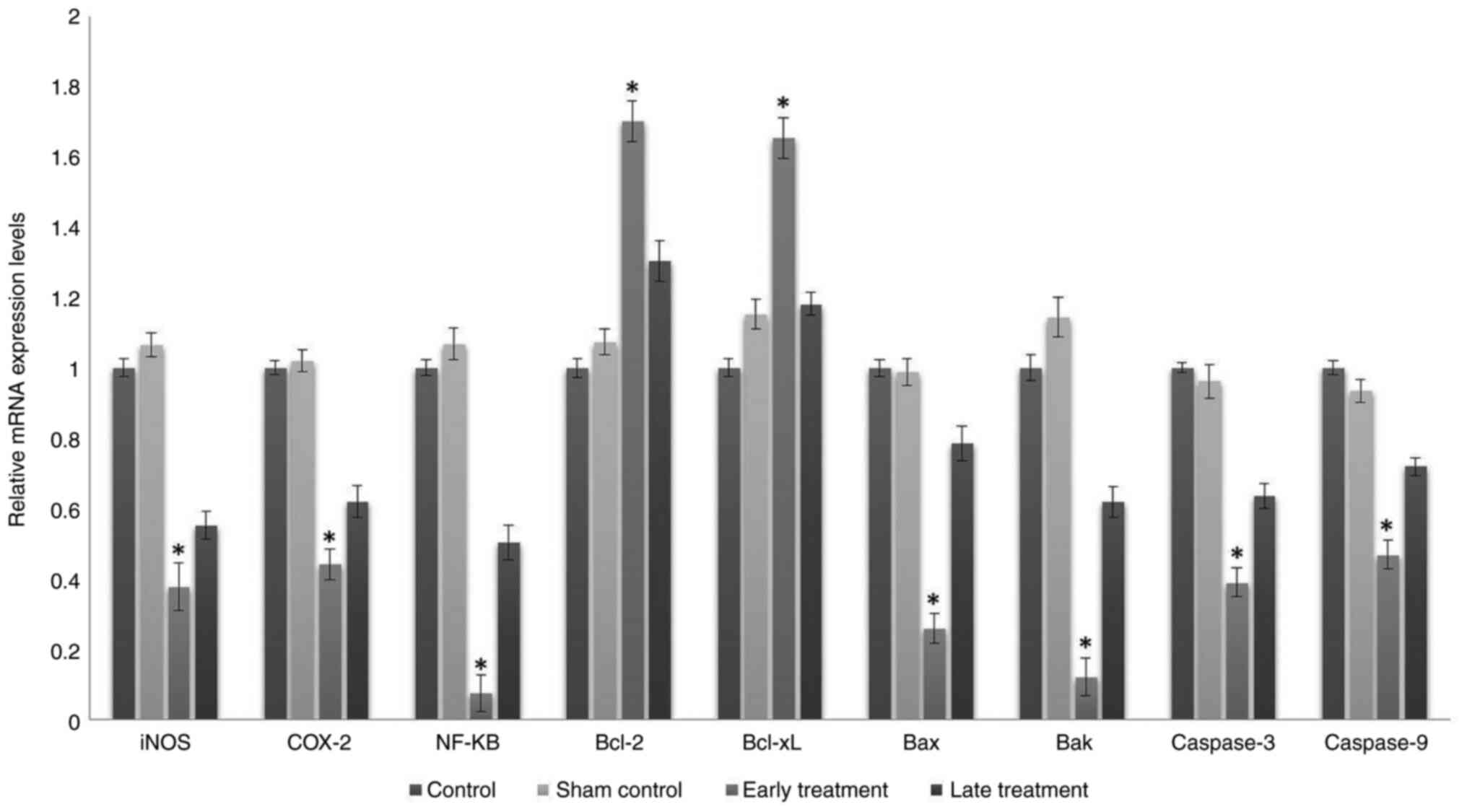|
1
|
Gates GA and Mills JH: Presbycusis.
Lancet. 366:1111–1120. 2005.PubMed/NCBI View Article : Google Scholar
|
|
2
|
Yamasoba T, Someya S, Yamada C, Weindruch
R, Prolla TA and Tanokura M: Role of mitochondrial dysfunction and
mitochondrial DNA mutations in age-related hearing loss. Hear Res.
226:185–193. 2007.PubMed/NCBI View Article : Google Scholar
|
|
3
|
Liu XZ and Yan D: Ageing and hearing loss.
J Pathol. 211:188–197. 2007.PubMed/NCBI View Article : Google Scholar
|
|
4
|
Perez P and Bao J: Why do hair cells and
spiral ganglion neurons in the cochlea die during aging? Aging Dis.
2:231–241. 2011.PubMed/NCBI
|
|
5
|
Bielefeld EC, Tanaka C, Chen GD and
Henderson D: Age-related hearing loss: Is it a preventable
condition? Hear Res. 264:98–107. 2010.PubMed/NCBI View Article : Google Scholar
|
|
6
|
Fujimoto C and Yamasoba T: Oxidative
stresses and mitochondrial dysfunction in age-related hearing loss.
Oxid Med Cell Longev. 2014(582849)2014.PubMed/NCBI View Article : Google Scholar
|
|
7
|
Chen H and Tang J: The role of
mitochondria in age-related hearing loss. Biogerontology. 15:13–19.
2014.PubMed/NCBI View Article : Google Scholar
|
|
8
|
Finkel T and Holbrook NJ: Oxidants,
oxidative stress and the biology of ageing. Nature. 408:239–247.
2000.PubMed/NCBI View
Article : Google Scholar
|
|
9
|
Tower J: Programmed cell death in aging.
Ageing Res Rev. 23:90–100. 2015.PubMed/NCBI View Article : Google Scholar
|
|
10
|
Park SN, Back SA, Park KH, Kim DK, Park
SY, Oh JH, Park YS and Yeo SW: Comparison of cochlear morphology
and apoptosis in mouse models of presbycusis. Clin Exp
Otorhinolaryngol. 3:126–135. 2010.PubMed/NCBI View Article : Google Scholar
|
|
11
|
Frémont L: Biological effects of
resveratrol. Life Sci. 66:663–673. 2000.PubMed/NCBI View Article : Google Scholar
|
|
12
|
Ozgová S, Hermánek J and Gut I: Different
antioxidant effects of polyphenols on lipid peroxidation and
hydroxyl radicals in the NADPH-, Fe-ascorbate- and Fe-microsomal
systems. Biochem Pharmacol. 66:1127–1137. 2003.PubMed/NCBI View Article : Google Scholar
|
|
13
|
Yumusakhuylu AC, Yazici M, Sari M,
Binnetoglu A, Kosemihal E, Akdas F, Sirvanci S, Yuksel M, Uneri C
and Tutkun A: Protective role of resveratrol against cisplatin
induced ototoxicity in guinea pigs. Int J Pediatr Otorhinolaryngol.
76:404–408. 2012.PubMed/NCBI View Article : Google Scholar
|
|
14
|
Bonabi S, Caelers A, Monge A, Huber A and
Bodmer D: Resveratrol protects auditory hair cells from gentamicin
toxicity. Ear Nose Throat J. 87:570–573. 2008.PubMed/NCBI
|
|
15
|
Seidman M, Babu S, Tang W, Naem E and
Quirk WS: Effects of resveratrol on acoustic trauma. Otolaryngol
Head Neck Surg. 129:463–470. 2003.PubMed/NCBI View Article : Google Scholar
|
|
16
|
Sánchez-Rodríguez C, Martin-Sanz E,
Cuadrado E, Granizo JJ and Sanz-Fernández R: Protective effect of
polyphenols on presbycusis via oxidative/nitrosative stress
suppression in rats. Exp Gerontol. 83:31–36. 2016.PubMed/NCBI View Article : Google Scholar
|
|
17
|
Heman-Ackah SE, Juhn SK, Huang TC and
Wiedmann TS: A combination antioxidant therapy prevents age-related
hearing loss in C57BL/6 mice. Otolaryngol Head Neck Surg.
143:429–434. 2010.PubMed/NCBI View Article : Google Scholar
|
|
18
|
Someya S, Xu J, Kondo K, Ding D, Salvi RJ,
Yamasoba T, Rabinovitch PS, Weindruch R, Leeuwenburgh C, Tanokura M
and Prolla TA: Age-related hearing loss in C57BL/6J mice is
mediated by Bak-dependent mitochondrial apoptosis. Proc Natl Acad
Sci USA. 106:19432–19437. 2009.PubMed/NCBI View Article : Google Scholar
|
|
19
|
Livak KJ and Schmittgen TD: Analysis of
relative gene expression data using real-time quantitative PCR and
the 2(-Delta Delta C(T)) method. Methods. 25:402–408.
2001.PubMed/NCBI View Article : Google Scholar
|
|
20
|
Pfaffl MW, Horgan GW and Dempfle L:
Relative expression software tool (REST) for group-wise comparison
and statistical analysis of relative expression results in
real-time PCR. Nucleic Acids Res. 30(e36)2002.PubMed/NCBI View Article : Google Scholar
|
|
21
|
Kalayam B, Meyers BS, Kakuma T,
Alexopoulos GS, Young RC, Solomon S, Shotland R, Nambudiri D and
Goldsmith D: Age at onset of geriatric depression and sensorineural
hearing deficits. Biol Psychiatry. 38:649–658. 1995.PubMed/NCBI View Article : Google Scholar
|
|
22
|
Murase T, Haramizu S, Ota N and Hase T:
Suppression of the aging-associated decline in physical performance
by a combination of resveratrol intake and habitual exercise in
senescence-accelerated mice. Biogerontology. 10:423–434.
2009.PubMed/NCBI View Article : Google Scholar
|
|
23
|
Hart N, Sarga L, Csende Z, Koltai E, Koch
LG, Britton SL, Davies KJ, Kouretas D, Wessner B and Radak Z:
Resveratrol enhances exercise training responses in rats
selectively bred for high running performance. Food Chem Toxicol.
61:53–59. 2013.PubMed/NCBI View Article : Google Scholar
|
|
24
|
Lorenz P, Roychowdhury S, Engelmann M,
Wolf G and Horn TF: Oxyresveratrol and resveratrol are potent
antioxidants and free radical scavengers: effect on nitrosative and
oxidative stress derived from microglial cells. Nitric Oxide.
9:64–76. 2003.PubMed/NCBI View Article : Google Scholar
|
|
25
|
Chung HY, Kim DH, Lee EK, Chung KW, Chung
S, Lee B, Seo AY, Chung JH, Jung YS, Im E, et al: Redefining
chronic inflammation in aging and age-related diseases: Proposal of
the senoinflammation concept. Aging Dis. 10:367–382.
2019.PubMed/NCBI View Article : Google Scholar
|
|
26
|
Someya S and Prolla TA: Mitochondrial
oxidative damage and apoptosis in age-related hearing loss. Mech
Ageing Dev. 131:480–486. 2010.PubMed/NCBI View Article : Google Scholar
|
|
27
|
Kashio A, Amano A, Kondo Y, Sakamoto T,
Iwamura H, Suzuki M, Ishigami A and Yamasoba T: Effect of vitamin C
depletion on age-related hearing loss in SMP30/GNL knockout mice.
Biochem Biophys Res Commun. 390:394–398. 2009.PubMed/NCBI View Article : Google Scholar
|
|
28
|
Seidman MD: Effects of dietary restriction
and antioxidants on presbyacusis. Laryngoscope. 110:727–738.
2000.PubMed/NCBI View Article : Google Scholar
|
|
29
|
Seidman MD, Khan MJ, Tang WX and Quirk WS:
Influence of lecithin on mitochondrial DNA and age-related hearing
loss. Otolaryngol Head Neck Surg. 127:138–144. 2002.PubMed/NCBI View Article : Google Scholar
|
|
30
|
Tavanai E and Mohammadkhani G: Role of
antioxidants in prevention of age-related hearing loss: A review of
literature. Eur Arch Otorhinolaryngol. 274:1821–1834.
2017.PubMed/NCBI View Article : Google Scholar
|
|
31
|
Marie A, Meunier J, Brun E, Malmstrom S,
Baudoux V, Flaszka E, Naert G, Roman F, Cosnier-Pucheu S and
Gonzalez-Gonzalez S: N-acetylcysteine treatment reduces age-related
hearing loss and memory impairment in the senescence-accelerated
prone 8 (SAMP8) mouse model. Aging Dis. 9:664–673. 2018.PubMed/NCBI View Article : Google Scholar
|

















